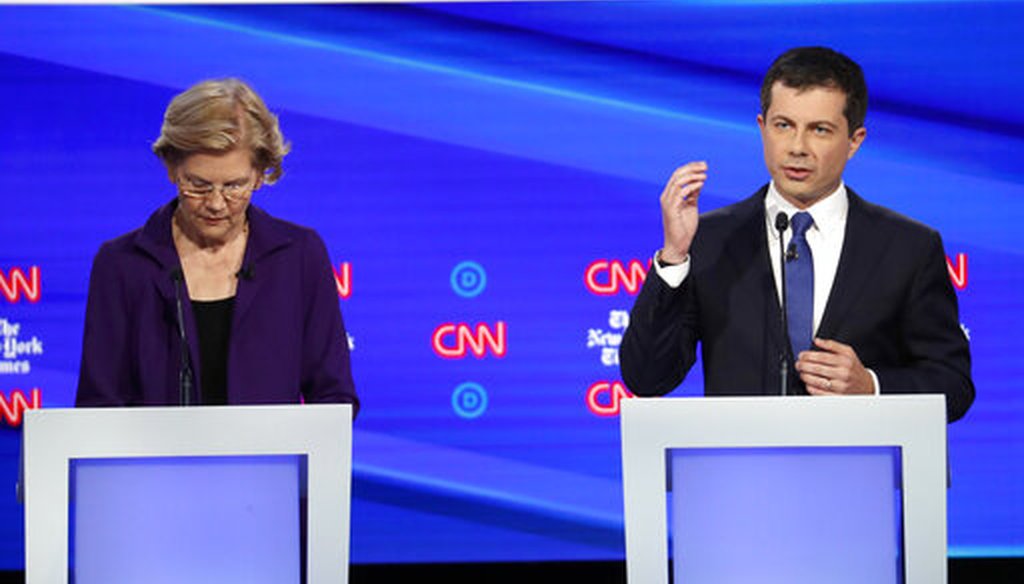

Our only agenda is to publish the truth so you can be an informed participant in democracy.
We need your help.


Elizabeth Warren and Pete Buttigieg sparred over health care during a Democratic presidential debate on Oct. 15, 2019, in Westerville, Ohio. (AP)
Pete Buttigieg sparred with Elizabeth Warren at the most recent Democratic debate over how to expand health insurance coverage for all Americans.
Buttigieg said he favors allowing Americans younger than 65 to enroll in Medicare if they wish. Warren, by contrast, prefers to transition all Americans from their current insurance plan to government coverage.
"Elizabeth supports Medicare for All, which would provide all Americans with a public health care program," her website says.
Here’s what Buttigieg said at the Oct. 15 debate in Westerville, Ohio:
"I don’t think the American people are wrong when they say that what they want is a choice. The choice of Medicare for All who want it, which is affordable for everyone, because we make sure that the subsidies are in place, allows you to get that health care. It’s just better than Medicare for All whether you want it or not. And I don’t understand why you believe the only way to deliver affordable coverage to everybody is to obliterate private plans."
Is Buttigieg correct to say that Americans prefer giving people under 65 an option to join Medicare as opposed to requiring them to give up their current coverage?
As we seek to answer this question, we’ll begin by noting that terminology and question wording matters a lot when pollsters ask Americans for their preferences.
Looking at the recent polls on health policy reveals a wide variation in how questions are worded making many of them not useful for refereeing the Buttigieg-Warren exchange.
However, we did find two polls from 2019 that are on point — and both of them support Buttigieg’s position.
An NPR/PBS News Hour/Marist poll conducted in mid July asked, "Do you think Medicare for All – that is, a national health insurance program for all Americans that replaces private health insurance – is a good idea or a bad idea?" This is essentially the Warren approach.
On that question, 41% of respondents thought that was a good idea, but a larger percentage – 54% – said it was a bad idea.
A second question by NPR/PBS/Marist asked respondents about an approach more in line with Buttigieg’s idea.
The survey asked, "Do you think Medicare for all that want it – that is, allow all Americans to choose between a national health insurance program or their own private health insurance – is a good idea or a bad idea?"
That proposal earned a strong thumbs-up from respondents: 70% said it was a good idea, with only 25% saying it was a bad idea.
A second poll – conducted by Kaiser in January 2019 – found stronger support for the Buttigieg approach than for the Warren approach.
The survey asked, "Do you favor or oppose having a national health plan, sometimes called Medicare-for-All, in which all Americans would get their insurance from a single government plan" – essentially the Warren approach.
For this question, a majority did favor it – 56% support compared to 42% opposition.
But support was even stronger for the Buttigieg approach. The survey asked, "Do you favor or oppose creating a national government administered health plan similar to Medicare that would be open to anyone, but would allow people to keep the coverage they have if they prefer?"
This drew support from 74% of respondents and opposition from only 24%.
A third option with a slightly different wording fared even better in Kaiser’s polling. "Do you favor or oppose allowing people between the ages of 50 and 64 to buy insurance through the Medicare program?"
This won the support of 77% of respondents, compared to only 18% opposition. Support was strong across all parties: It won 85% support from Democrats, 75% support from Independents, and 69% from Republicans.
Kaiser’s most recent polling, released the same day as the debate, shows a steady rise in support for the Buttigieg approach – from 65% in July to 73% in October – and a steady decline for Warren’s approach – from 56% in January to 51% in October.
Buttigieg said that Americans "say that what they want is a choice" to join a single-payer system like Medicare rather than ending private insurance.
Polling on this question shows higher levels of support for an opt-in approach to expanding Medicare than for a required switch away from private insurance. We rate the statement True.
New York Times, "Elizabeth Warren and Pete Buttigieg Clash on ‘Medicare for All,’" Oct. 15, 2019
Pollingreport.com, health survey archive, accessed Oct. 15, 2019
Kaiser Family Foundation "Health Tracking Poll – October 2019: Health Care In The Democratic Debates, Congress, And The Courts," Oct. 15, 2019
Kaiser Family Foundation, health tracking poll, January 2019
Kaiser Family Foundation, "Public Opinion on Single-Payer, National Health Plans, and Expanding Access to Medicare Coverage," Oct 15, 2019
Elizabeth Warren, health policy page, accessed Oct. 15, 2019
Washington Post, "Where 2020 Democrats stand on Medicare-for-all," accessed Oct. 15, 2019
In a world of wild talk and fake news, help us stand up for the facts.
